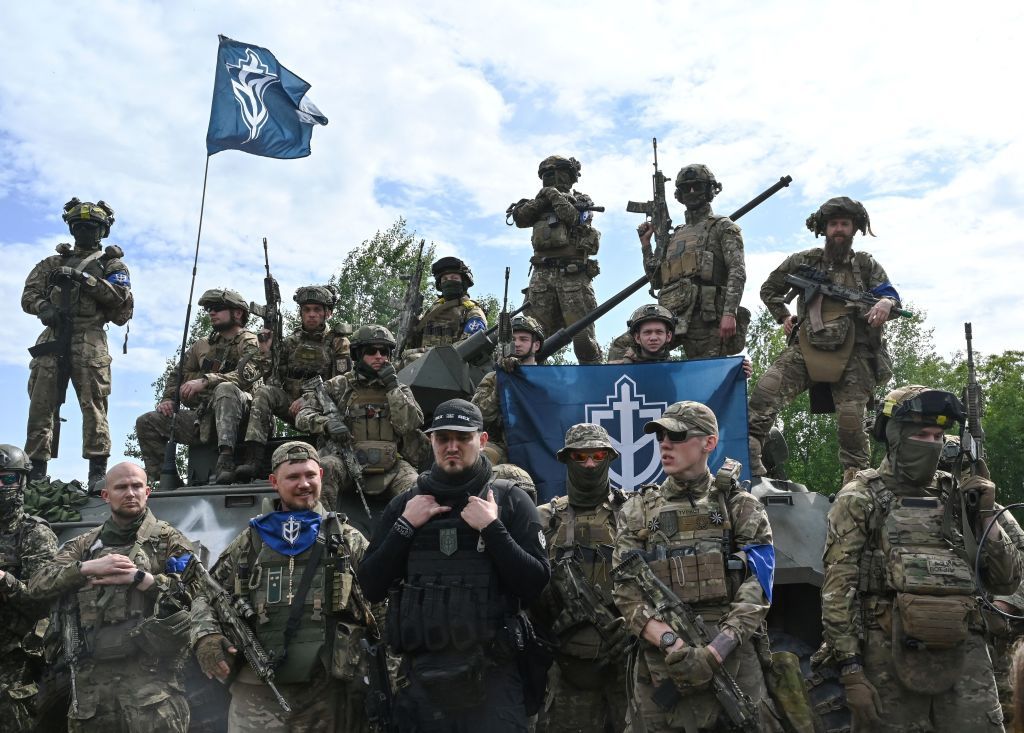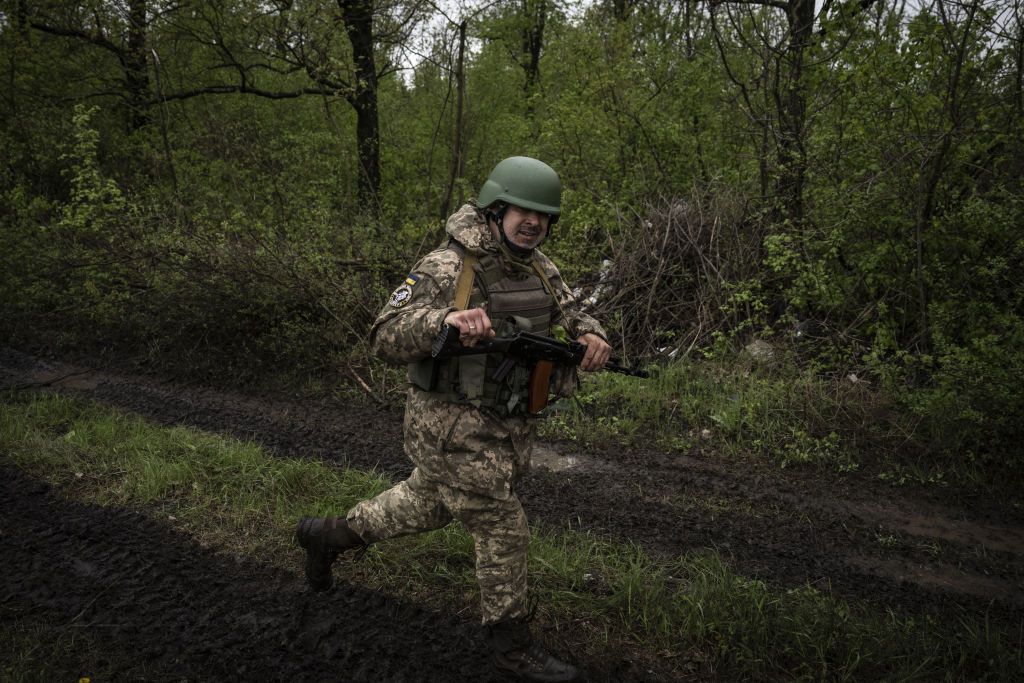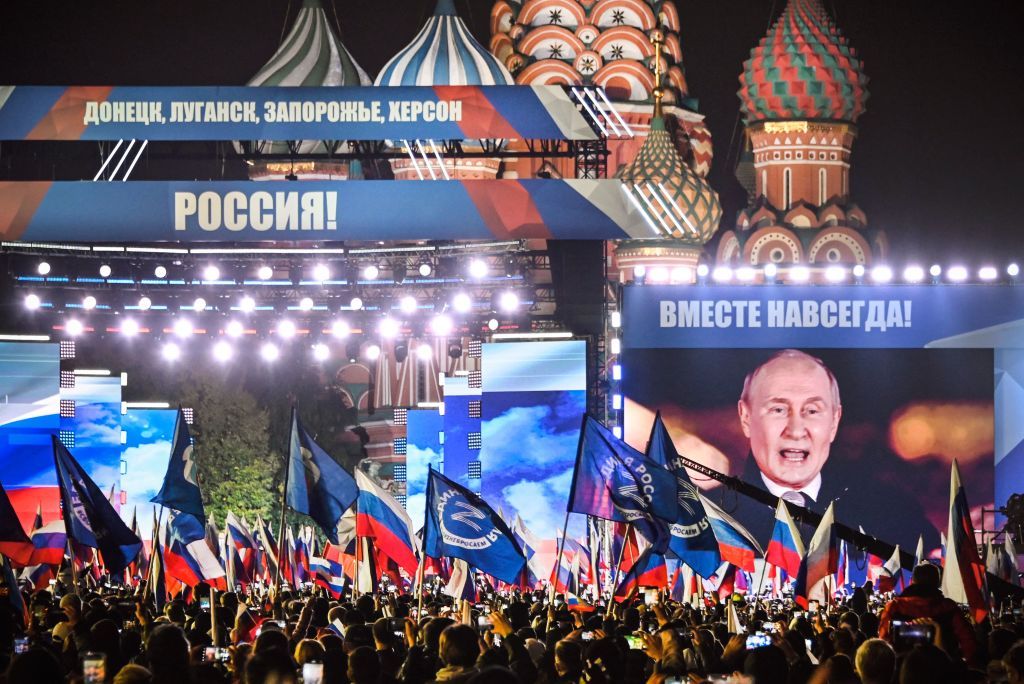
Editor's Note: The Kyiv Independent, together with a number of journalists, was taken to a location in northern Ukraine to interview the members of the units that took part in the military operation inside Russia. Not revealing the exact location was the only precondition for the interview.
Northern Ukraine – At an abandoned gas station in northern Ukraine, five cars with Russian volunteers fighting on Ukraine's side waited for journalists.
A few days after a successful incursion inside Russia's Belgorod Oblast, those who took part wanted all the attention they could get.
The Russian militia groups, who call themselves the Russian Volunteer Corps (RVC) and the Free Russia Legion, say they have been fighting alongside Ukraine in some of the hottest spots of the war, including Ukraine's Donbas.
They now claim to have attempted to bring the fight into Russia, even if for a short while.
While many details of the operation still remain unclear, the cross-border incursion into Belgorod Oblast, which borders Ukraine, appears to have been the boldest operation since the start of Russia's full-scale invasion.
In early March, the Volunteer Corps' incursion into Russia's Bryansk Oblast was a similar yet much shorter endeavor.
Denys Kapustin, also known by his alias White Rex and ties to the Russian far-right, leads the so-called Volunteer Corps.
He said the operation that began on May 22 ended a day later when an undisclosed number of soldiers returned to Ukraine. He claimed his troops only suffered two light injuries.
"I think that any crossing of the state border with the Russian Federation and a successful return can certainly be called a success," Kapustin told journalists.
According to him, his group held "around 42 square kilometers" of land in Russia for "quite a while" during the operation.

When asked by the Kyiv Independent what the Volunteer Corps wants to prove to the Russian public with these operations, Kapustin said it is the vulnerability of the Kremlin regime and that Russian President Vladimir Putin's powers are "not unlimited."
"I want to prove to (Russians) that it's possible to fight against a tyrant," Kapustin said. "The FSB (Federal Security Service) can beat, control, and torture unarmed (Russian citizens). But as soon as they meet with full-fledged armed resistance, they run away."
To convey their message to the Russian people, the group consulted with the Ukrainian military and received some tangible help – such as medical support for wounded soldiers, Kapustin told the Kyiv Independent.
But much is unknown about the two Russian units said to be fighting for Ukraine, including their size and what roles they have taken during the war so far.
The Ukrainian public has been rather skeptical of the units' participation in active fighting due to a lack of visual evidence, with some also questioning why there is no report of their casualties.
 The Kyiv IndependentAsami Terajima
The Kyiv IndependentAsami Terajima
While the units claimed responsibility for the incursion, Russia immediately accused the Ukrainian military's "sabotage group" of launching a cross-border assault – a claim immediately denied by Kyiv.
The two units say they work with Ukraine's military within its ranks, but "everything we do, every decision we make behind the state border is our decision," Kapustin explained.
It's unlikely that such a complex operation could have been possible without Ukraine's direct military command.
Days after the incursion, the biggest question remains the origin of U.S.-made Humvee and MaxxPro military trucks – shown in videos and images – that allegedly ended up in Russia. The U.S. has provided the same vehicles to Ukraine as part of its $37 billion in military aid.
Ukraine denies any involvement in providing the weapons.
During the meeting with journalists on May 24, Kapustin denied the involvement of Western equipment or weapons within his group.
The White House has said it is now investigating the reports that "U.S. equipment and vehicles could've been involved" in the fighting within Russian borders.
A top Ukrainian official, willing to stay anonymous to speak freely, said that the U.S. didn't contact Ukraine's leadership concerning the Belgorod incident.


Russian Volunteer Corps
About 20 soldiers, some with their faces covered with balaclavas, stood together in front of an armored military vehicle, a "military trophy" they claim to have brought back from their latest operation inside Russia.
Only one representative from each Russian unit spoke to journalists.
Kapustin's Russian Volunteer Corps, which he says was established on Aug. 22, 2022, is a volunteer unit largely composed of ethnic Russian emigrants who have lived in Ukraine or abroad.
While founded much later, Kapustin said that some volunteers have fought in the war since 2014 and the early months of the 2022 invasion. The Volunteer Corps was said to be established in order to make it easier for Russian nationals to join the fight against Moscow's invading army.
Kapustin told the Kyiv Independent that the corps continues to receive many applications, claiming that its popularity rose just as Moscow announced mobilization in September 2022. He said, "When mobilization began in Russia, we received 200 applications per day."
The corps fighters' age varies from 19 to mid-40s, according to Kapustin, who himself is in his late 30s.
Kapustin, who goes by the nom de guerre named after his white supremacist clothing brand White Rex, is also known as a former mixed martial arts fighter and for his connections to other neo-Nazi organizations around the globe.


Free Russia Legion
The other military unit, Free Russia Legion, was founded much earlier, on March 11, 2022.
In April that year, three now-former Russian soldiers – who did not reveal their names – held a press conference in Kyiv, where they said they had found out about the legion when they were held in Ukrainian captivity as POWs and chose to join after witnessing Russia's brutality in the war against Ukraine.
The legion's spokesman goes by his call sign Tsezar (Caesar).
According to Tsezar, civil war is brewing in Russia amid growing support for groups like the Free Russia Legion and the Russian Volunteer Corps. He insisted that the fighters are simply "peacekeepers" in Ukraine, whose priority remains helping Kyiv win the war.
He claimed that destabilizing Russia was not in his group's interests.
"I just want to go home and live in peace," Tsezar, a 49-year-old from St. Petersburg, said. "I want Russia to stop bombing Ukraine, I just want Russia and Ukraine to live in peace."
Tsezar described the legion as "more centrist" than the right-wing Russian Volunteer Corps. The legion is reportedly largely made of prisoners of war who were captured in Ukraine and former military personnel with experience and knowledge of Russian military tactics.
"We will change Russia, freeing the territory and creating centers of new Russian power there," Tsezar told the Kyiv Independent, repeating the narrative that Russia is "occupied" by the Kremlin regime.
"We know that the people support us, and every day this support is increasing," he added.
Participation in groups such as the corps and the legion is punishable by law in Russia. It violates at least two articles of Russia's Criminal Code for acting against state interests, each bringing a potential prison sentence of up to 20 years.
In March this year, the Russian Supreme Court recognized the Free Russia Legion as a "terrorist organization whose activities are prohibited on the territory of the Russian Federation," Russian Interfax reported.



Ongoing operation
Just days after the cross-border incursion in Belgorod Oblast, much is still unclear about the operation.
Tsezar, from the Free Russia Legion, said that the task was "to carry out deep reconnaissance in combat" and not to reach Belgorod city, the regional center.
His legion claimed in the afternoon on May 22 that it had "liberated" the border village of Kozinka with the Russian Volunteer Corps and entered the neighboring Graivoron town.
Russian authorities claimed that a cross-border Ukrainian shelling in the morning occurred just before the fighting broke out.
The Kyiv Independent could not independently verify these claims.
The incursion showed that "the military-political leadership of the Russian Federation is absolutely not ready for such things," Kapustin told journalists.
By the evening, the local authorities had announced a "counter-terrorist operation" in Belgorod Oblast and that the "majority" of residents in bordering villages had fled their homes.
While Russia says it has strengthened its defense in bordering regions, the incursion suggests otherwise. Belgorod Oblast authorities reportedly spent nearly 10 billion rubles (about $125 million) on "the construction of protective structures" in 2022, Russian Interfax news reported in February, citing the regional construction minister Oksana Kozlitina.
 The Kyiv IndependentKatie Marie Davies
The Kyiv IndependentKatie Marie Davies
The Kremlin framed what it claimed was an incursion of Ukrainian saboteurs as Kyiv's attempt to distract attention from its loss of Bakhmut – a city in eastern Ukraine essentially captured by Russia after suffering enormous casualties amid more than ten months of heavy fighting.
Ukraine denied the Russian accusations, with the military intelligence saying that only the two Russian volunteer units were involved.
Senior Ukrainian officials, including President Volodymyr Zelensky, remained silent on the Belgorod combat operation. A top Ukrainian official, willing to stay anonymous to speak freely, confirmed the knowledge of such an operation beforehand.
It remains unclear whether the Russian anti-government groups captured any villages on May 22 or May 23, according to the analysts at the Institute for the Study of War (ISW), a D.C.-based think-tank analyzing the war in Ukraine.
Kapustin from the Russian Volunteer Group, however, said on May 24 that the operation is "ongoing."
"It definitely has various phases, so phase one, we consider it a successful phase – it's over now," he explained. "But the operation is ongoing, that's what I can say for now."
"It's only the beginning," he added. "The Russian-Ukrainian border is pretty long, so yet again, there will be a spot where things will get hot," Kapustin said, promising more attacks in the future.
 The Kyiv IndependentAlexander Khrebet
The Kyiv IndependentAlexander Khrebet
______________________________________________________
Note from the author:
Hi, this is Asami Terajima, the author of this article.
Thank you for reading my story till the end. I hope you enjoyed it, it's a little bit different from my usual reports from the Donbas front lines. While much remains unknown about these two Russian anti-government groups fighting alongside Ukraine, I think it's important for Ukraine to get as much support as possible from all across the globe. To help the Kyiv Independent continue reporting on the ground, please consider supporting us by becoming our patron.
Comments
No comments yet. Be the first to react!